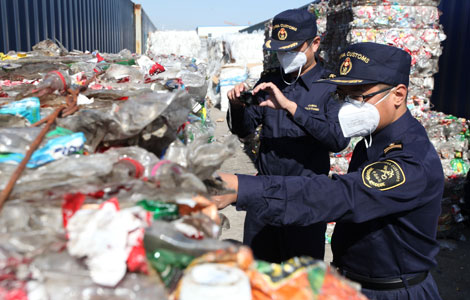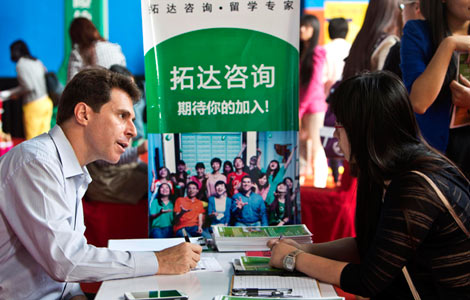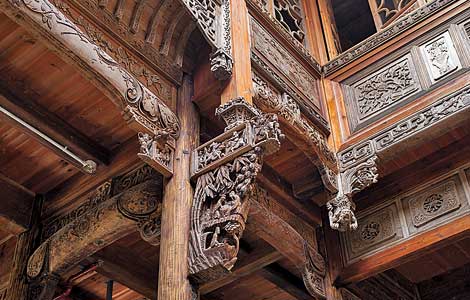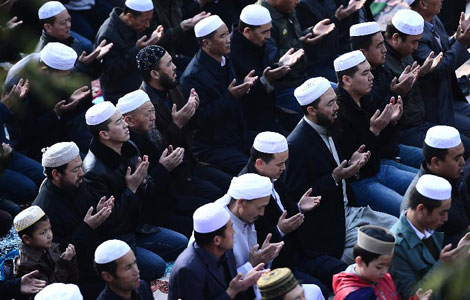Brewing up ever more sales of ales
Updated: 2013-10-17 07:12
By Xie Yu in Shanghai (China Daily)
|
||||||||
Fierce competitors
Beer sales in China rose 4.8 percent last year, to 47.5 billion liters. By 2016 they could top 61 billion liters with sales growth of premium brands set to outpace that of economy brews, market researcher Euromonitor International predicts.
"The annual sales growth rate used to be as high as more than 10 percent before 2008 but has fallen to single digits in the last five years. Low-price competition is no longer the big trend in the market. On the contrary, competition in the middle- to-high end market is becoming more fierce," said Fang.
It seems unbelievable that a bottle of beer can cost 50 yuan because traditionally people consider it similar to a soft drink, while Chinese baijiu can command big money.
However, in the next few years, the structure of beer products will transform with industry consolidation. Low-end products will shrink remarkably, while middle- and high-end sales will surge and the super high-end segment may be owned by foreign brands, Fang added.
AB InBev has set a goal for its global leading brand Budweiser to become the most preferred premium beer brand in China.
First created in the US, Budweiser entered China in the mid-1990s.
"We actually began as a latecomer in the market. There were other beer brands in the premium segment in 1995 with a strong market share. Our initial launch of Budweiser in 1995 didn't go as well as expected," said Doukeris.
There were a number of issues, including undifferentiated packaging, marketing that wasn't relevant to the customer and the employment of a US-style distribution model that did not apply in China, he explained.
But now, in 2012, Budweiser volumes in China are growing in double digits, making China the biggest contributor to Budweiser's growth globally. Budweiser's share of the premium market accounted for 42 percent in the full year of 2011 in China.
This year, the company introduced an upgraded Budweiser - Budweiser Supreme - to the China market to strengthen its strategy of promoting high-end beer products in China.
The product sells for at least 20 yuan per bottle in some Chinese restaurants.
Meanwhile, the company is introducing a line of other high-end beers including Stella Artois and Leffe to more emerging bars, restaurants and hotels in big cities.
AB InBev has been expanding "aggressively" in the Chinese market, said Fang.
The company opened breweries in Southwest China's Sichuan province in 2011, the southeast's Fujian and central's Henan provinces in 2012. This year it added breweries in the northeastern provinces of Liaoning and Jilin.
"We are No 3 in China now. There is plenty of room for us to improve market share," said Doukeris.
Through mergers and acquisitions and building new breweries, the company now has the biggest production capacity in the beer industry in China and operates 25 Chinese beer brands.
Industry consolidation
China is far from a consolidated industry where competitors can decide what to do because of too many brewers, Doukeris said.
The market is still very fragmented with more than 250 beer producers and 2,000 brewers. Beer price are also very low.
However, Doukeris noted that big cities are more consolidated than small cities and provide opportunities for high-end, high-price products.
"Smaller cities are seeing faster growth in sales. The competition is about total volume, and total size of the market," he said. While in big cities where the market is more stale, and industry players are targeting the premium sector for higher profit. "I believe with time, the brands will be everywhere," he said.
The company is building Budweiser into the most important leading brand in China's premium segment, and building Harbin, a local brand that is very popular in northeast China into a national brand in a much bigger segment the middle and high market.
In fact, not only AB InBev, but other big players are seizing opportunities during the consolidation period.
Based on Euromonitor statistics, the big four companies and others have spent a total of $1.7 billion in 18 deals for breweries in China as they scrambled to snap up local partners and build market share.
Sun Mingbo, chairman of Tsingtao Brewery, commented at a recent food safety forum held in Beijing: "The beer industry has been struggling with production capacity surplus for years but the consolidation is speeding up."
The big four make up 61 percent of the market in China. In the next phase, some big brewers may also be acquired by stronger companies, he said.
As for Tsingtao Brewery, Sun said his company regards the China market as its "major battlefield" and will focus on the domestic market by elevating its brands and acquiring other brewers.
Most Viewed
Editor's Picks

|

|

|

|

|

|
Today's Top News
US not budging on its arms restrictions on China
Can cranberries catch on in China?
Asia-Pacific pays executives world's highest salaries
US debt deal a temporary fix
China is No 1 oil importer
Millennials worried about finances
Elderly group sorry about roles in turmoil
Investigation to diagnose nation's TCM resources
US Weekly

|

|













